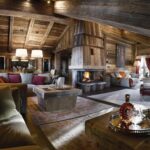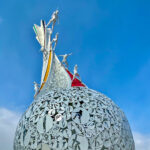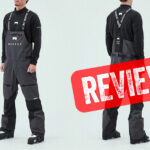Revelstoke has had its share of growing pains since it became a “resort” in 2007.
It isn’t every day that you get to witness the birth of a ski area. And depending on who you talked to in Revelstoke, B.C., December 22, 2007, was either a day that you’d been salivating over for three decades to take place, or it was going to spell Armageddon for a small-town way of life.
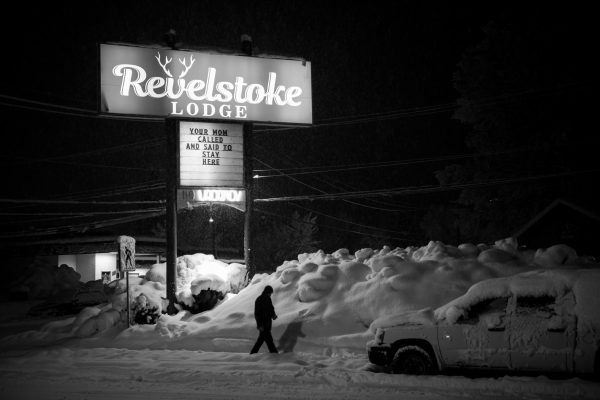
For that was the day that the spanking-new Revelstoke Mountain Resort turned on the power and fired up two lifts to open the most anticipated ski destination in North America.
And what a day it was. Snow fell like giant sacks of confetti were being unceremoniously ripped open from the clouds above. Young guns from Whistler, Rossland, Banff, and as far away as Tahoe and Colorado were there—floating through thigh-deep fluff, flying blind off rocky bluffs into pillows of powder already three metres deep, racing helter-skelter in all directions.
As heli/backcountry ski guide Joey Vosburgh says, “For those first two seasons, the place was anarchy. You could ski and ride pretty much anywhere.” It was, in fact, the dirtbag dream—heli-skiing (make that “unguided” heli-skiing) for the price of a season pass—day after day after day.
The best part of the story is how the citizens of Revelstoke responded. Like Nelson in the West Kootenay, Revelstoke’s downtown had undergone a heritage facelift in the early ’80s, thanks to a generous grant program that sandblasted and restored heritage buildings on Main Street. New restaurants—including one of B.C.’s finest sushi bars—opened. Sure, you could rent gear at the hill, but there were core retail shops in the town centre as well. A craft brewery—the renowned Mt. Begbie Brewing Company—was open even before the ski hill’s reboot.
Vosburgh lived in a van for a couple of seasons before he purchased a home in 2007. “I sold my place in Calgary and was looking for a town with a true community vibe,” he says. “Revelstoke is a place that attracts a lot of people who practice an organic and highly principled lifestyle.”
For 17 years, Joe Lammers’s freeskiing career and extensive network of friends and community revolved around the country’s freeride epicentre, Whistler. “But I was priced out of the real estate market,” says Lammers. “When I moved here, I started to make the transition away from film segments and worked for three years as the ski patrol supervisor. But in the summer, I had to travel to remote areas for rigging and safety work. I’d always been a bit of a real estate nerd, so I decided to get my realtor’s licence.”
With so much media attention, it didn’t take long for the rest of the skiing world to take notice. According to Lammers, three things contributed to creating awareness about Revelstoke on an international level. “You have to start with the quality of the terrain, the abundant snowfall and—when you factor in Revy’s vast backcountry—the relative lack of skiers. In the 14 years since I moved here, snow conditions have been remarkably consistent, which is something that film crews such as Matchstick and Teton Gravity Research need in order to get segments in the bag.”
By the time the ski hill had passed its tenth anniversary in 2017, the overall economy was strengthening, with growing pains finally in the rear-view mirror. Excitement was building for another round of expansion and development. And then COVID hit.
In previous recessions, it seemed to many that most sectors of the economy suffered equally. Tourism—especially small, independently owned restaurants, retail shops and service providers—have experienced the worst of all possible worlds. While small businesses stayed afloat with the assistance of wage subsidy programs, service and retail workers availed themselves of the Canadian Emergency Recovery Benefit which, in some cases, paid almost as much per month as their previous jobs did. When people began to emerge from shutdowns, hundreds of thousands of workers took a hard look at what they’d been doing previously and decided to pass.
Sally Robertson (Carmichael) managed the highly successful marketing launch of condo units at Nels Nelsen Lodge (now known as Sutton Place Revelstoke) for Sotheby’s Canada. After her contract wrapped up, she and her husband decided to put down roots in Revelstoke permanently. “I realized that we were in the best place possible to raise our daughter. Although small and somewhat isolated, Revelstoke is a global community, with a broad perspective. From international support initiatives to local food security, passionate and engaged teachers to caring neighbours, Revelstoke has been more than I could have ever imagined.”
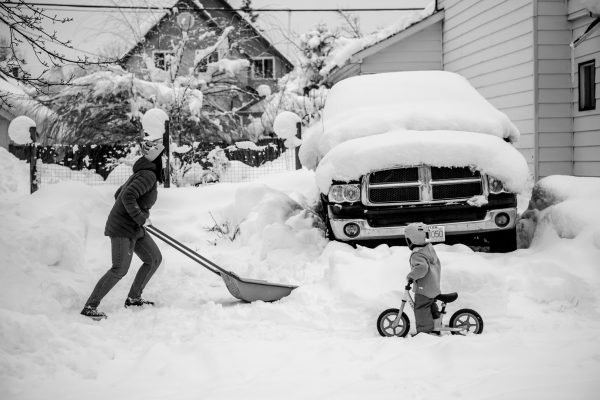
Some of her optimism is tempered by the timing of their arrival in town in 2006. “We bought a place before the opening of the ski resort, before the rebound from the recession of 2009 and before the urban flight due to COVID. It’s disheartening to see families not able to afford to live in Revelstoke, not able to buy homes and have to leave where they either grew up or where they imagined they might make a home and raise their children. It’s disheartening to see businesses close or reduce hours because they can’t find the staff. It’s history repeating, and you’d think it would be a community that could have anticipated this, learning from other ski resorts, but there’s no formula or simple solution.”
Ironically, Revelstoke residents had their chance. While fiddling with real estate figures can be somewhat misleading, especially in markets where there might not be many listings and a big sale can skew averages, Revelstoke house prices hovered at around the $250,000 mark from 2010 to 2016—a prolonged hangover from the financial crisis that began in 2008. Local real estate developers looking to supply new housing stock during that time were frustrated by the ponderous and bureaucratic approval process.
Originally from North Vancouver, Bryce Borlick says that “moving to Revelstoke was an easy choice for me. I came here in 2016 to live a slower life in a mountain town, and there are really only a half-dozen or so great towns in B.C. Revy was my choice because it has an amazing ski hill, great ski touring, huge snowfalls, good mountain biking, alpine hiking in the summer and relatively few people.” Revy stands out in a few other ways, too.
The lure of the outdoors is obvious; but Borlick, like Robertson, has found energy and inspiration in the town’s community spirit. “People look out for one another here and volunteerism is quite strong. It’s actually a bit odd for a place with so much ‘ski transience,’ but it seems like even the ‘seasonaires’ (people who are here for just one season) get right into it. New, high-value businesses pop up every year, restaurants in particular. If you’re savvy, you can carve out a good life here.”
Robertson and Borlick believe that the community has generally rallied around the COVID health-care directives issued by B.C.’s Provincial Health Officer Dr. Bonnie Henry to Be Kind, Be Calm and Be Safe.
Vosburgh isn’t so sure. “Some of my close friends do have strong feelings about vaccinations that put them very much at odds with a majority of the people who live here. It really sucks to see the town being torn apart this way; the year before COVID, everyone was so energized.”
Vosburgh, who is one of the few certified splitboard ski guides in Canada, says that “COVID really hit the guiding community hard. I hustled my butt off and my income was slashed in half. And of course, it’s got a ripple effect—if affluent international clients aren’t coming, then cafés, restaurants, bars…everyone is losing business. It’s probably taken us back 10 years in terms of overall prosperity.”
As a landlord, Borlick knows that “housing is hard to find, and it’s expensive. Prices have more than doubled in the time since I’ve been here, and rents have skyrocketed, too. We’re already seeing people leave either because they just can’t make ends meet anymore or because they want to buy a house and can’t afford one here. Like in Vancouver, kids here say they won’t be able to afford to live in Revelstoke as adults. COVID accelerated the changes that were already happening. Most notably, the remote workers who had been trickling in came as a wave this year, snapping up many of the houses with cash they made on Vancouver real estate.”
“Being a traveller and avid skier myself, I knew the need for development,” says Sky McLean, CEO of Basecamp Revelstoke, the recently built multiple studio to six-bedroom complete properties overlooking the Columbia River. “Every time I visited it was so hard to find a place to stay and I knew our unique Basecamp formula would be a perfect fit for the area. We’re proud to be able to help enhance and contribute to the amazing Revelstoke community, including using local trades and shops and employing as many locals as possible. We also offer staff accommodations to all of our employees to ensure they have a great place to call home.” So successful, a second Basecamp project begins building in town next spring.
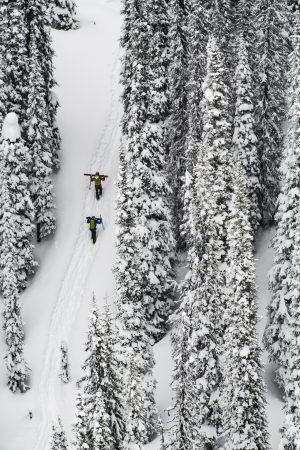
For photographer Bruno Long, COVID and the town’s high living costs have forced a personal reckoning. “I had co-owned a house here at one point—it’s one of the creative, or desperate, ways that people come up with to stay here—but I was forced to sell last year. It was incredibly challenging to find even a one-bedroom apartment or suite to rent. I’m not at an age where I’m going to rent a place with a half-dozen 20-year-olds who want to party all night.
“You can see the animosity on social media; Facebook groups where people are desperate to find housing and landlords are asking outrageous amounts for rent. Thing is, if they hang on, they normally get it. Of course, maybe the landlords need to get that kind of money in order to pay their mortgage. If you missed the boat when it came to buying real estate during the decade when home prices were flat, you probably won’t get back in.”
To many mountain-town dwellers, B.C. has always stood for “Bring Cash,” but Long has no problem with these affluent newcomers. “I’ve had a great run here, and I’m the first to admit that as a photographer, I’ve been an ambassador for the town and my images are part of the attraction. We want people to vacation here and yeah, a lot of people with money will end up buying second homes. I’m not going to tell someone who’s cashed out from the Coast or wherever that they can’t or shouldn’t buy a place here.
“I’ve been really lucky because my photography work is combined with my love for skiing, mountain biking and trail running. But I’ve been looking around at places like Kimberley or Nakusp, where you can still get a fixer-upper for around $300,000 and put in a mortgage-helper suite to pay it off.”
Creativity is often the key to being able to thrive—and not just survive—mountain-town life. Lammers quite literally dropped a pre-fab home onto his property at Shelter Bay, about 25 minutes south of town on the banks of Arrow Lake. “Whistler has Pemberton and Nelson has Ymir. You often see new communities develop down the road from established resorts.”
Whether you’re here for a good time or a long time, Robertson advises newcomers that “a sense of humility really goes a long way. There is fatigue in Revelstoke, like all small communities, especially those that are seasonal/tourism-based destinations. The struggle between welcoming guests and newcomers while protecting the values of your community is very real. This is not only COVID-related, it’s been compounded by the housing crisis, an influx of second homeowners and the sense that what was once an insulated community dependent on natural resources has somehow been eroded. I would urge newcomers to get involved at some level whereby they are supporting, not being supported by those less fortunate in the community.” Borlick agrees. “There’s a steady flow of newcomers and that brings a kind of festive and open-minded vibe to each season. Even lifelong locals appreciate that vibrancy and generally think it’s great that people like their town. I’ve yet to find that particular kind of ‘semi-local’ who’s been here for three to five years and is a jaded dick about it. We have a saying here: All friends on a powder day!”
